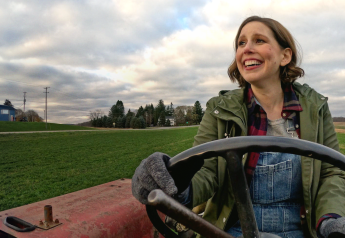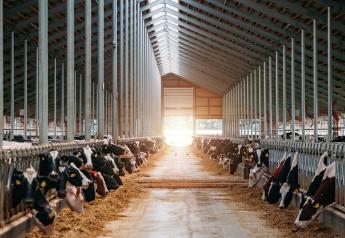National Natural Foods Chain Pulls All ‘Confinement Dairy’ Products

Natural Grocers by Vitamin Cottage says the move to sell only dairy products from pasture-based animals "will cut through consumer confusion." But others say the premise is "ridiculous."
A national natural foods chain announced April 29 that its nearly 90 stores will no longer sell dairy products that come from "confinement dairies."
Colorado-based Natural Grocers by Vitamin Cottage said it hopes the move to sell only dairy products from animals that are pasture-based "will cut through consumer confusion, start more conversations about how our food is raised and how that can impact hidden costs."
The food chain described a confinement dairy as a facility where "the emphasis is on production. The animals do not graze on growing pasture and live their unnaturally shortened lives enclosed in a barn or dirt yard."
"Advertising buffets us with images of happy, healthy cows grazing on grass, but in many cases that’s not what is happening," said Heather Isely, who helped shape the policy as executive vice president for Natural Grocers by Vitamin Cottage. "Consumers have told us they aren’t sure about what they’re buying or where it came from. And they do care, because there are a lot of documented unintended consequences associated with confinement dairies."
"At the same time," Isely added, "there’s increasing evidence that ‘old school’ dairy practiced in new ways – meaning animals raised in a managed-pasture system – has nutritional benefits, benefits for the land, benefits for the farmers and the animals themselves. By only carrying pasture-based dairy we are more transparent, we give our customers peace of mind and also expand the market for dairy farms that want to raise their animals on pasture."
Not so fast, said Noa Roman-Muniz, a professor in the animal sciences department and Dairy Extension specialist at Colorado State University. "You cannot equate animal well-being, milk quality or environmental impact with any one production type," Roman-Muniz said. "There is no scientific basis for that assumption."
Being a conventional, organic or pasture-based dairy doesn't define animal well-being, Roman-Muniz added. "It's how the dairy is managed," she said.
Colorado dairy producer Jim Docheff is outraged at Natural Grocers’ announcement and claims. "It makes my blood boil," says Docheff, a fourth-generation Colorado dairy farmer whose operation milks 600 Jerseys and Holsteins near Longmont. "Their claims are absolutely ridiculous and based on emotions. You can't find any scientific data to back them up."
Even so, Docheff believes such claims must be refuted. "They can do a lot of damage when they don’t have their facts straight," he says. "We need to dispute them."
For example, he says, it’s not true that pasture-based dairies have healthier soil or that conventionally housed dairy cows are routinely pumped full of artifical hormones. "And dairies have lowered their carbon footprint tremendously," Docheff adds.
"It's not fair to beat up on dairies, whether they're conventional, organic or pasture-based," said Jon Slutsky, who milks 1,370 Holsteins near Wellington, Colo. "We're all providing a nutritious food for our customers. Environmentally and nutritionally, we all strive for the same thing. We just don't always get the credit that we should."
Roman-Muniz agrees that the Natural Grocers’ pasture-based dairy decision will perpetuate misinformation already prevalent in the minds of many consumers. In her role as a Dairy Extension specialist, she frequently speaks with middle-school students and their parents. Their general responses often are that organic milk is more nutritious or that dairy cows are fed "unnatural" diets which aren’t good for the animals – none of which is supported by science.
"The public is really misinformed about dairy products and how they’re produced," says Roman-Muniz. "We need to come to the table and have an honest discussion. Different dairy sectors should not attack each other because that creates fear and concerns about the safety and quality of milk."
Natural Grocers has locations across Colorado, Texas, Utah, Wyoming, Oklahoma, Missouri, New Mexico, Montana, Kansas, Idaho, Nebraska, Arizona and Oregon. The national chain employs more than 2,000 people. The company went public in July 2012.
Natural Grocers said the process of researching and replacing confinement dairy products with comparable pasture-based dairy has taken its executives to view dairies nationwide and extensively research others, from Strauss Family Farms in California to Maple Hill Creamery in New York, from Dreaming Cow in Georgia to Windsor Dairy in Colorado, and the many farmers across the country who sell their milk to the Organic Valley Dairy Cooperative.
There are no pasture-based dairies in Colorado, which produces about 3 billion pounds of milk a year.







